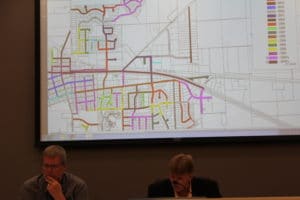by Dave DeMars
The St. Joseph City Council tackled the city budget for 2019 at the Aug. 20 meeting. This is the first in a series of budget discussions that will take place over the coming months. The budget does not have to be finalized until December.
The budget discussions were wide and far-ranging and at times seemed to get stuck on small points, but it’s a necessary and important tool for the council as it allows for future planning projected out several years.
“We take a five-year approach to planning,” City Administrator Judy Weyrens reminded the council.
The goal is to identify what projects the council would like to undertake and if it’s a multi-year project, to allot funding for the project over the years so the project can be completed. Because some projects are funded through bonding, identification of the projects in advance is necessary so bonding money can be secured. Budgeting is especially important when it comes to replacing equipment, maintaining streets, sewer and water projects and other similar projects, Weyrens explained.
The budgeting process also helps in managing the tax requirements so constituents don’t get hit with unexpected large increases. The capital budgeting process is broken into seven areas: administrative, Economic Development Administration, police, public works, engineering, enterprise and fire.
Council member Anne Buckvold raised a question in connection to use of the half-cent sales tax in the budgeting process and was informed that because of state restrictions, that money can be used only for specific types of projects. In this case it can only be used for funding needs in connection with the Jacob Wetterling Center and the community center.
Administrative budget
Council member Dale Wick dug into the meat of the the administrative budget, which is sometimes referred to as the general budget, and questioned the costs of new signage. Presently in 2018, $2,500 has been budgeted with a balance of $5,300 approved in connection with the sign for a total of $7,800 applied to signage over two years. Additional funds have been budgeted for years 2020 through 2023.
Council member Bob Loso followed up with a question on the engineering budget asking whether it was possible for engineering to include when a street or project was completed so the council had a more complete picture of how the project performed before making decisions on whether to put additional money into upgrading the project.
Buckvold said she would advocate for funding of the Elm Street extension project, and said she was pleased the underpass under CR 75 was included in the budget. The Elm Street extension is a $1.3-million project, but it’s not high priority at this time. The underpass is a $3.6-million project started in 2017 and slated to be finished in 2019. The city has gotten some help from the state on this project.
Engineering budget
Attention then turned to Jade Road which the council would revisit several times during the meeting. Public Works Director Terry Thene said the road was in bad shape and what was desired was to patch and perform enough minimal maintenance this year to hold the road together until next year when it would get a major upgrade.
“We just want to get it through the winter season,” Thene said.
This approach made no sense to Mayor Rick Schultz who questioned whether it was really necessary to do road work to the tune of $10,000 when a year later the same road would get a major $420,000 upgrade in terms of resurfacing and widening.
Wick wondered how property owners will respond to assessments for improvements to the road that would benefit their properties. He suspected the city would wind up paying for it since there are only five property owners on Jade Road.
Jade Road has been the subject of attention going back to 2005, according to City Engineer Randy Sabartz. The problem is the property in that area did not get developed as expected.
In his final remarks on the issue, Wick said Jade Road is not legally part of the city yet since the annexation process hasn’t been completed. It belongs to the township, he said. Wick said let the problem remain with the township and the city will deal with the problem next year. The city has set aside $422,000 for a major upgrade of the street.
EDA and police budgets
Council members then turned their attention to the EDA and police department budgets. It appears a change in the way of acquiring police squad cars will take place. The leasing programs that previously provided the squad cars have undergone changes and price increases and it does not make financial sense to lease any more. So in the future, the department will likely begin to purchase their own squads and maintain them in-house.
Many cities that own their own squad cars run them to 105,000 to 106,000 miles before replacing them, said Chief Dwight Pfannenstein. Most new cars are covered for 100,000 miles on the power train, so the major types of repair are usually covered by the manufacturer.
Public Works budget
Wick opened up the discussion on the public works budget by noting in 2019 there is a 98 percent increase in the budget from $64,170 to $127,000. He noted $60,000 of that increase was because of the public works building expansion, but he wondered if that was a necessary item. For one thing, he wondered if all the equipment was necessary, and whether the replacement of items was always necessary. The council did not have good data as to how much the equipment was being used or how.
“It would be nice to know in the inventory of equipment how many hours it (a piece of equipment) is being used per month, and the dollar in maintenance, instead of just coming and saying, we need more equipment,” Wick said.
Wick went on to say it’s possible that after looking at the usage factors, and the maintenance factors, it would make more financial sense to lease or rent the equipment rather than to buy and maintain the equipment. That would also cut down on storage costs of equipment.
That kind of data analysis hasn’t been done yet and would take a good deal of time, Weyrens explained.
“But right now we are being asked to buy new equipment, but we don’t know what that number (usage and maintenance number) is,” Wick said. “We don’t know the stuff you guys keep track of, the number of maintenance hours.”
Wick said he asked for this information during last year’s budget discussions and still has not received the information.
“Going forward when you ask for a piece of equipment to be replaced, all that data before it gets to us,” Loso said.
Buckvold noted many times justification is simply that a new piece of equipment will be more “efficient.”
“I don’t know what that means,” she said.
Part of the efficiency has to do with not having to move three pieces of equipment to get to the tractor that might be used to do the job, it was explained.
But Wick answered, asking how long does it take to move three pieces of equipment in and out of storage. And if we know that a storm is coming, we can put that equipment in position ahead of time. We should be able to plan for it, he said.
Enterprise budget
In the closing minutes of the meeting, there was discussion of moving the food shelf and historical society to the Kennedy building and what could be done with the old building.
The need for a water-system analysis, the drilling of new wells and the building of a second water tower were also briefly discussed.
Garbage
The final issue of the evening revolved around the spring and fall clean-up efforts in which the city picks up trash of citizens. The program is being abused. Some people are having friends from other areas bring trash into town to be disposed of. Wick confided after the meeting he had heard of one instance where 12 old windows were placed on the curb, yet the house had not had any new windows installed. Each of the council members shared they had heard similar stories.
They also acknowledged policing the abuse would be difficult, but were hopeful citizens would not abuse the service and would report those who do abuse it. Pfannenstein said legally citations could be issued for illegal dumping. The fine for such an offense is $700.
Other actions
Police Officer Brent Fandel was sworn in and will be working for the St. Joseph Police Department.
The council approved a Jaycees request to run meat raffles at La Plalyette.
The council approved a temporary liquor license for St. Joseph Catholic School in connection with an outdoor event known as Rocktoberfest on the school premises for one day, Sept. 29.

Mayor Rick Schultz administers the oath of office to new police officer Brent Fandel. Fandel has worked in several area police departments and comes highly recommended.

Council member Dale Wick (left) and Mayor Rick Schultz (right) study a map of the City of St. Joseph that shows street projects from past years and projects for the near future. There is much to do, and the tough part is deciding on what projects get addressed first.

Comprehensive plan research includes pop-surveys at places such as the St. Joseph Farmers’ Market.


